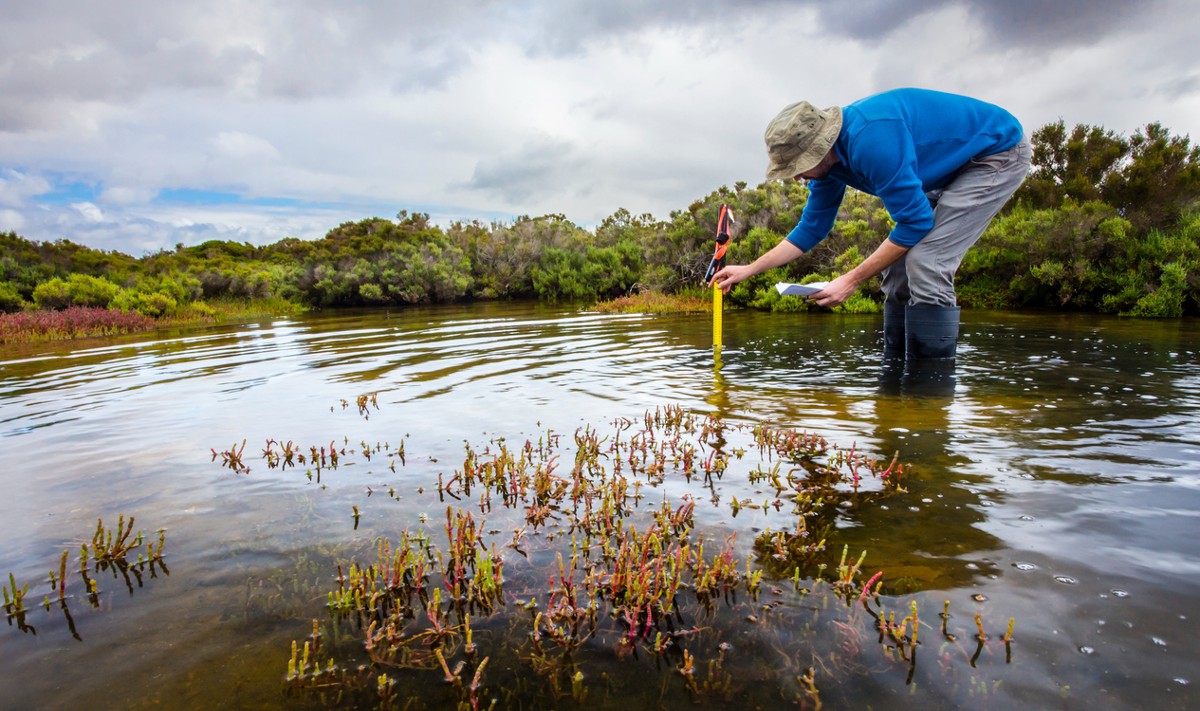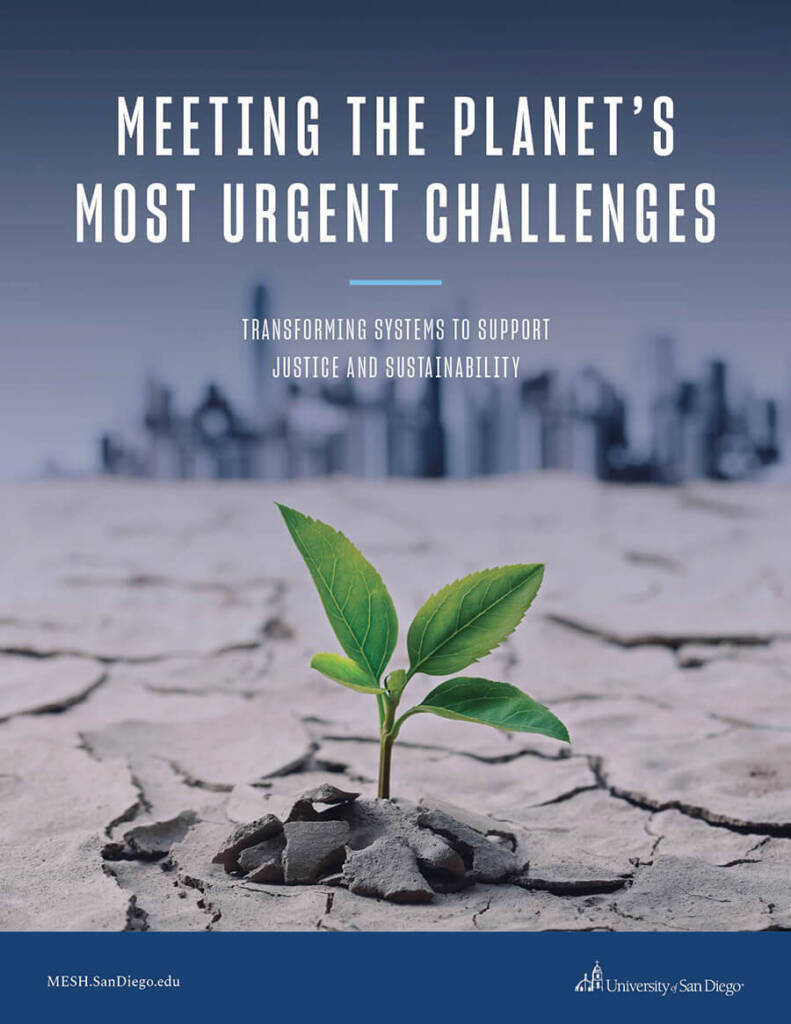Are you passionate about researching and understanding the environment, what causes it to change or be restored? Then a career as an environmental scientist could be a powerful and effective way to solve many of our most pressing environmental problems. Environmental scientists work across every scientific field to find beneficial solutions for both the natural environment and humanity.
No matter which field you’re interested in, there are positions for environmental scientists in government, higher education, nonprofit organizations and private companies. Here’s what you need to know about this essential career position, including responsibilities, salary and how you can become an environmental
What Is Environmental Science?
Environmental science is an interdisciplinary field consisting of the life, physical and earth sciences. These different fields can include ecology, biology, zoology, oceanography, atmospheric science, soil science, geology, chemistry and more.
You can think of environmental science as two-fold:
- To study and understand natural phenomenon and ecosystems, which can include physical, chemical and biological aspects of the environment
- To study and understand how humans and man-made processes interact with and impact the environment
The goal of environmental science is to identify and address environmental problems — whether natural or caused by humans — and to develop science-based solutions.
What Does an Environmental Scientist Do?
The job of an environmental scientist is primarily research-focused. They’re expected to utilize their scientific training and knowledge to gather data, conduct analyses, present their findings and make recommendations for other professionals with the aim of positively impacting the environment and protecting human health. Depending on the position, an environmental scientist could work in a laboratory, office or classroom or spend time out in the field.
They can work in private industry, in education and research facilities or as part of state, local or federal agencies. For example, an environmental scientist that works for a federal government agency may study changes in water contamination levels and make suggestions to regulators on how to update pollution regulations. Or, an environmental scientist employed by an agricultural enterprise could research new products that are intended to protect nutrient levels in soil.
Specific tasks for an environmental scientist may include:
- Evaluating the needs of natural environments and identifying threats to their health and stability
- Proposing projects to study, prevent, address or fix environmental problems
- Assessing the environmental risks posed by new products or projects
- Defining data collection methods for research projects and investigations
- Collecting and compiling environmental data for scientific analysis
- Analyzing samples, surveys and other sources of information
- Preparing reports and presentations to explain their research and findings
- Making recommendations for further action
Career Path for Environmental Scientist
Most environmental scientists will need to earn a bachelor’s degree, usually in environmental science, and should also consider building job experience as an intern or research assistant. Those interested in a specific career path within environmental science, such as addressing toxic waste cleanup, wildlife preservation, land conservation, mining reclamation or soil erosion, can consider majors such as agricultural science, ecosystem science, geography, soil science or ecology.
Your specific career path as an environmental scientist will depend largely on your interests and passions. Just a handful of different career specializations within environmental science can include:
- Environmental Protection and Compliance — Specialists in this field monitor the effects human activity has on the environment in order to protect or restore different ecosystems through policy and regulations.
- Environmental Chemistry — The study of chemical and biochemical processes and how they impact ecosystems to mitigate the risks that chemical hazards and waste pose to environmental and human health.
- Environmental Health and Safety — These specialists study the interplay between the environment and human health to research potential health hazards such as unsafe drinking water, disease and food safety.
- Environmental Engineering — Specialists who are trained as engineers can utilize engineering principles to design, build and implement solutions to protect, preserve and restore the environment.
- Wildlife or Marine Biology — These fields focus on the observation of wildlife or ocean life to protect and manage native species. Their intent is to study and preserve natural habitats and resources.
Different positions will also be better fits for certain skills or talents. Consider working in positions that align with your skills and interests.
- Field analysts work mainly outdoors collecting and analyzing meteorological data, water and soil samples. This is a great position for those who prefer to work out in the field and see the direct impacts of their work.
- Environmental researchers work mostly in research laboratories, analyzing data and environmental statistics to draft in-depth reports. Scientists in these positions need strong analytical, communication and public speaking skills.
- Environmental science technicians perform laboratory and field tests and are largely responsible for setting up and maintaining equipment. Strong collaboration skills and technical knowledge are helpful for this position.
Earning an advanced degree can help you find higher-paying positions or more specialized jobs, such as environmental specialist, environmental manager or environmental affairs specialist. While a doctoral degree is not a requirement for most environmental scientist positions, it will be necessary if you’re considering a position as a professor at a college or university.
What Is the Average Salary for this Position?
As with most positions, the exact salary for an environmental scientist will vary based on job requirements, level of experience, geographic location and industry. Indeed lists a base average salary of $65,222, while Salary.com lists a range between $42,728 and $66,089 for entry level positions.
According to the U.S. Bureau of Labor Statistics (BLS) the median annual wage for environmental scientists and specialists is $76,480. The BLS predicts a higher than average level of job growth of 6% for environmental scientists and specialists from 2022 to 2032, with an estimated 6,900 openings each year.
Salaries and job openings will vary across industries, but working as an environmental scientist is more than just building a professional career. Environmental scientists are able to make real, meaningful contributions to improving health and wellness for the environment and our communities.
What Skills Are Needed to Start a Career as an Environmental Scientist?
This role is heavily research-oriented, so any aspiring environmental scientist will need training in data collection, research, analysis and writing technical reports. Depending on the industry and position, an environmental scientist may need to understand and be current on all relevant environmental compliance laws, regulations and standards. In the U.S. for example, you’d need to be familiar with the regulated topics and sectors overseen by the Environmental Protection Agency.
Environmental scientists that work as field analysts, research assistants or environmental science and protection technicians will also need to be skilled in working with equipment, tools and software used for environmental testing. This can include specialized equipment such as:
- Biofuel analyzers
- Electron microscopes
- pH meters
- Gas chromatography instruments
- Elemental analysis instrumentation
Aside from their technical skills and experience, environmental scientists will need strong “soft” skills, including:
- Communication: Environmental scientists will need to present and explain their findings to audiences of varying backgrounds, including professionals from other disciplines and representatives from the government and general public.
- Collaboration: No matter their positions, at some point every scientist will work on teams with their peers, alongside engineers, technicians and assistants. To be effective, all team members need to be able to collaborate and work together.
- Problem-solving: Critical thinking and innovation are core problem-solving skills that any scientist will need to arrive at the best possible solutions. To do so, a scientist needs the capacity to both see the larger picture, but also pay attention to the smallest details.
- Project management: Scientists not only need to ensure their own projects are completed on time and on-budget, but if they work as managers or supervisors, they’ll also need to ensure that everyone is working toward established goals and has access to necessary resources.
What Qualifications Are Needed?
Exact qualifications will vary by position, especially across different industries. In general, qualifications consist of:
Degrees from Accredited College or University Programs
Most entry-level jobs will require a bachelor’s degree in environmental science or a similar natural science field, such as biology, chemistry or geosciences. However, a master’s degree may be preferred by some companies and organizations or required for advanced positions such as environmental manager, health and safety officer or environmental consultant.
Advanced degrees can also provide important skills and experience outside of the hard sciences. Courses in environmental policy and regulation can be crucial for understanding compliance matters. Transdisciplinary programs such as the Master of Science in Engineering, Sustainability and Health (MESH) can provide scientists with a wider lens into other disciplines, collaborating with other disciplines instead of separate from them — offering a better approach that improves the environment.
Specific Industry Certifications
Industry certification provides environmental scientists with a greater understanding of the basic principles of environmental science. As a resource, they’re a valuable way to demonstrate your knowledge and expertise.
- The National Registry of Environmental Professionals (NREP) offers several certifications for different industries, such as the Associate Environmental Professional, Certified Environmental Scientist, Certified Environmental and Safety Compliance Officer and Registered Environmental Manager.
- The Ecological Society of America (ESA) offers several levels of certification for environmental scientists who wish to be recognized as professional ecologists and demonstrate their commitment to the ESA’s code of ethics.
- The Institute of Hazardous Materials Management (IHMM) offers professional credentials, including Certified Hazardous Materials Managers (CHMM), Certified Hazardous Materials Practitioner (CHMP) and Certified Dangerous Goods Professional (CDGP).
- Both the EPA and OSHA have Hazardous Waste Operations and Emergency Response (HAZWOPER) standards that must be met when dealing with hazardous substances or a substantial threat of a hazardous substance release.
Who Hires Environmental Scientists?
Environmental Scientists can find employment across a wide variety of fields.
- Local governments employ environmental scientists and specialists as part of their water and transportation departments and to oversee infrastructure and environmental matters.
- The U.S. federal government employs thousands of environmental scientists for the Environmental Protection Agency, the National Park Service, the National Oceanographic and Atmospheric Administration, the Department of Energy and other related agencies.
- Both the private and nonprofit sectors employ environmental scientists to work in all areas that interact with the environment, including construction, mining, public health, architecture, energy and utilities.
- Universities will also hire environmental scientists as part of their research teams and to lead undergraduate and graduate level programs.
A search of different job aggregator sites including Indeed and Glassdoor in December 2023 found job listings for environmental scientist positions at:
|
|
How Do I Become an Environmental Scientist?
To be an environmental scientist you will need at least a bachelor’s degree from an accredited university, preferably in environmental science or other natural science fields. Being such a wide field with many possible career options, it’s best to consider your own skills, interests and passions.
- Do you want to work more out in the field or in a laboratory?
- Do you want to do more public sector or private sector work?
- Is there a particular field you’re more interested in? For example, water conservation, wildlife preservation or green energy development?
- Is your long-term goal to advance to upper level management positions, or do you feel like you’re more suited toward a life of research?
Once you have an idea of your key interests, start researching the job market for positions that match. Looking into their requirements for education, experience and skills will give you a better idea of what to focus on. And if you’re ready to start doing the work, make note of internships or other opportunities to work as a research assistant or field technician.
Having a strong network can provide you with helpful guidance as well as access to important resources and certifications. Consider join a professional organization such as:
- National Association of Environmental Professionals
- American Geosciences Institute
- National Environmental Health Association
- Association for Environmental Studies and Sciences
The more you collaborate with other like-minded professionals, the more you understand the different possibilities that are open to you. Joining a transdisciplinary degree program such as MESH can help bolster your experience and help you develop a more nuanced perspective on environmental matters, from environmental engineering and policy creation to effective communication and promoting issues of environmental justice.
Visit our program page to learn more about how you can enrich your career by working with other like-minded professionals in a transdisciplinary environment.


![Preview image of 19 Climate Change Careers Changing the World [+Education & Experience Requirements]](https://onlinedegrees.sandiego.edu/wp-content/uploads/2024/03/19-climate-change-careers.jpg)

